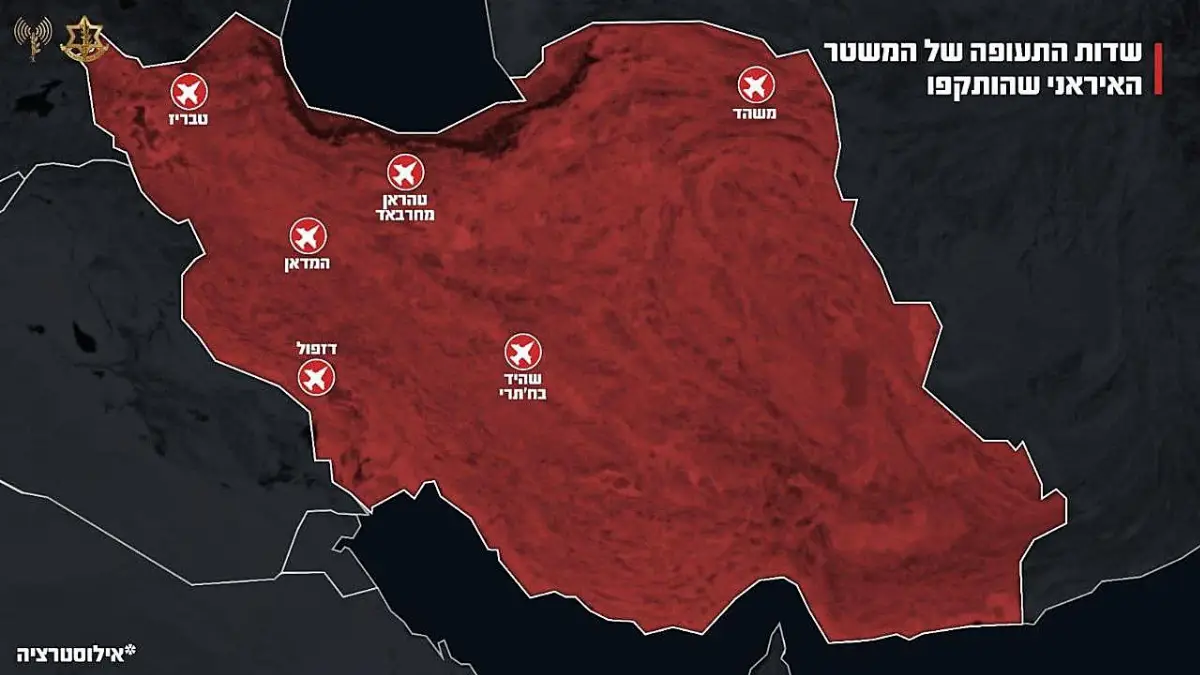
Israel launches air raids on six Iranian military airports
Idf claims attack on key Iranian Air Force infrastructures; aircraft and helicopters destroyed

Among others, attack helicopters AH-1, fighters F-14 and F-5, an aerial refuelling aircraft, landing runways, refuelling systems, and underground bunkers used by the Iranian armed forces were targeted
Tensions in the Middle East reached a new peak yesterday, June 22: the Israeli Defense Forces (IDF) confirmed having conducted a series of targeted airstrikes against six military airports in various regions of Iran. The operation, carried out "across the western, eastern, and central areas of Iran" and employing drones, had the declared objective of "weakening Iran's capability to conduct aerial operations" and "damaging its military air infrastructure".
According to an official IDF statement, the strikes destroyed 15 Iranian combat jets and helicopters, including F-14 and F-5 aircraft as well as AH-1 attack helicopters, in addition to an aerial refueling plane. The raids also caused significant damage to runways, refueling systems, and underground bunkers used by the armed forces. Among the targeted airports, the IDF specifically cited Mehrabad Airport in Tehran, and the airfields of Mashhad and Dezful, releasing images they claim confirm the damage. The Israeli military also stated it hit "missile storage and launch sites in the Kermanshah region", believed to be used for attacks against Israeli territory. The Defense Force specified that "our intelligence guided the strikes" with the aim to "gain control of Iranian airspace" and "prevent future Iranian support for aerial missions against Israel".
The Israeli action follows by only one day a wave of Iranian missile launches directed against Israeli cities such as Tel Aviv and Haifa (see for details AVIONEWS), which in turn were a response to previous US airstrikes on three Iranian nuclear sites that took place last weekend. This sequence of events has transformed a proxy conflict into a direct confrontation with a rapid and dangerous escalation.
International reactions
International reactions to the cross-attacks have been immediate and polarized.
Condemnations and concerns: among the voices of condemnation, Russian President Vladimir Putin today received Iranian Foreign Minister Abbas Araghchi in Moscow, where he expressed Russia's position on the regional escalation. Turkey, through its parliament, unanimously adopted a motion condemning the Israeli attacks as "threats to regional peace and crimes against humanity". China called for de-escalation to avoid a wider conflict, while the Secretary-General of the United Nations, António Guterres, expressed deep concern over the spiral of violence, urging all parties to "exercise utmost restraint." The International Atomic Energy Agency (IAEA) urged Israel not to strike Iranian nuclear sites, reminding of the contamination risk and reaffirming that there is no evidence Iran is working on an atomic weapon.
Approvals and Support: on the other side, the United States reaffirmed their "firm support" for Israel’s security, without confirming a direct role in the latest Israeli strikes but emphasizing Israel's right to self-defense. Israeli press sources reported that Prime Minister Benjamin Netanyahu and Defense Minister Israel Katz coordinated the attacks with Washington. Some analysts noted that the US administration approved "targeted and singular actions with no other objectives than destroying Iran’s nuclear program", although the scope of the IDF’s strikes appears to go beyond this. The United Kingdom and France, while calling for moderation, expressed concern over Iranian actions and its regional destabilization, having previously participated in intercepting Iranian drones and missiles defending Israel. Saudi Arabia and the United Arab Emirates have also provided intelligence to Israel regarding prior Iranian attacks.
As alarm sirens continued to sound in various Israeli cities into the morning of today, June 23, and Tehran promises retaliation, the international community remains on alert for the risk of a further and broader conflagration in the region.
AVIONEWS - World Aeronautical Press Agency